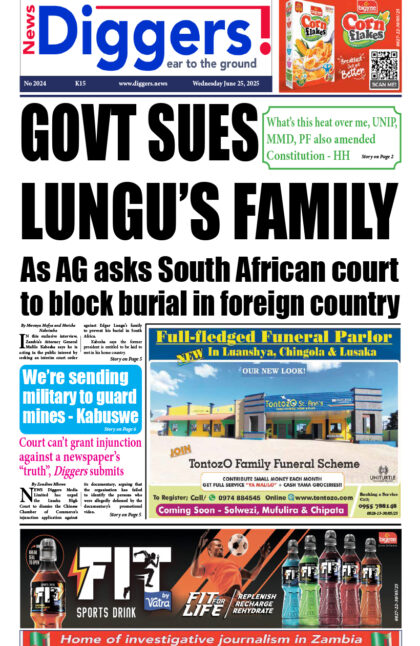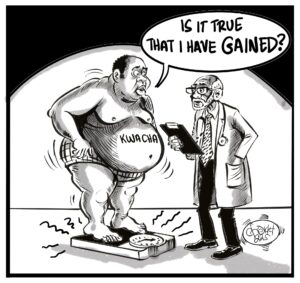Justice Minister Given Lubinda says journalists will play a critical role in the fight against corruption if they create a collaborative mechanism with government investigative wings, where some of the information gathered can be used for prosecution.
Lubinda also says he will task the Law Development Commission to help the media with understanding the institutional characteristics that need to be put in place before the Public Interest Disclosure Act can be revised to include whistleblowers who give information to the press, rather than investigative wings.
Meanwhile, Financial Intelligence Centre Director General Mary Chirwa says the K106 billion 2020 national budget will not meet its objectives if illicit financial flows will not be arrested.

And Drug Enforcement Commission (DEC) public relations officer Kamufisa Manchishi said the media needs to co-exist with law enforcement agencies in fighting illicit financial activities.
The trio was speaking at the OSISA/News Diggers organised Whistleblowers Protection Conference in Lusaka yesterday.
Explaining the Whistleblowers Protection campaign, Free Press Initiative founder Joan Chirwa said it was an anomaly that the definition of a Whistleblower in the Constitution under the Public Interest Disclosure Act does not recognise whistleblowers who give information to the press.
“We the media are concerned that the Public Interest Disclosure Act or Whistleblower Protection Act Does Not Recognise whistleblowers who pass information through the media. Some whistleblowers are not comfortable giving information to investigative wings for various reasons. Some think that it is not safe and they cannot be protected. So in the end, they rush to the media where they feel safe. So if this law say you are only a whistleblower if you report to ACC or DEC or Police, and not the media, then we feel left out,” Chirwa explained.
“Some of the information that we receive from sources is very critical and can be used even in prosecution of some cases. We would like to have a situation where the media can collaborate with investigative wings so that we ca give them that information or evidence of a crime. But our ethics do not allow us to disclose our sources so, we need our sources to be protected under this law.”
Chirwa further complained to the minister and heads of investigative wings present that the relationship between the media and investigative wings was unhealthy.
In response, Lubinda said the Whistleblower protection campaign was a huge initiative that government would support, but urged media houses to consider that investigative wings operated under regulated guidelines.

He said one only becomes a protected whistleblower if they report to regulated law enforcement agencies.
“The Public Interest Disclosure Law protects whistleblowers and defines whistleblowers as people who report to a given number of institutions. And your argument is that the list of institutions to which people who report become whistleblowers should be expanded to include the press. I am only a whistleblower if I go and report to those agencies that are mentioned in the law. Am I a whistleblower if I go to a football stadium and get a loud speaker or a microphone and start shouting ‘that one is a thief?’ No. According to the law, I am not a whistle blower. I only become a protected whistleblower if I go and report to those named agencies,” he said.
Lubinda also said Law Enforcement Agencies do not have sufficient capacity to fight all corruption, adding that public pressure sometimes forces officers to prosecute weak cases which end up in acquittal.
“We don’t have sufficient capacity to fight graft. There are so many cases that are reported but so few cases are prosecuted successfully. Sometimes these investigative wings are put under so much public pressure that they decide for the sake of showing that we are active ‘let’s prosecute.’ They go to court [which is another regulated wing of government with set standards. When this matter is brought before the courts of law, the courts makes sure that the accuser provides evidence beyond any reasonable doubt. If the prosecution fail to meet that threshold, what happens? Acquittal! Once that person has been acquitted and yet the public were told by the press [that] this one is guilty, then the public now says the court is corrupt,” Lubinda said.

Lubinda further said the corruption which some media practitioners publish is not aimed at fighting the scourge but hell bent to destroy other people’s personalities.
“Some of your practitioners, what they write and publish is bent not to win the fight [against corruption] but it is hell bent to destroy the personalities. Some of your publications, if you ask me, I see it on the streets and I say, what a waste of paper. You may actually be carrying some stories which are highly credible but unfortunately you may have lost me somewhere and I lost confidence in you. And that is me, a human being. So now, what about agencies? For them, the level of credibility must be impeccable. There are some of you [and] I am sorry, sometimes you call me and say ‘we want to get an interview’ and then I say ‘sorry I am not available. I don’t want to waste my time with you. I am sorry. I am a public officer but for you, I am not available I am busy,” he said.
The minister said journalists would play a critical role in the fight against corruption if they worked with investigative wings and pledged government’s support towards the campaign.
“My point of view is that yes, everybody must be involved in the fight against corruption [and in] the fight against abuse but then we must be able to streamline and say ‘what are the laws and responsibilities of each player?’ All of you here, we have numerous stories that you carry and when you are asked [to say] this is a very interesting story. We want to follow it up. DEC pick it up and they say ‘this is very important for us [and] we want to pick it up.’ Then again you want to protect your sources. And you have the right to protect your sources because if you don’t protect them then you are breaching your ethics. And so as far as the public is concerned, [the law enforcement agency] is not performing their functions,” Lubinda observed.
“This is a very important matter you want to discuss. You have my total support and through me you have the total support of government. We want everyone to get involved especially when the initiative is demand driven like this. My encouragement to you is that you should grow this. This is a very important exercise. Build it. And if you wish the support of the Ministry of Justice on behalf of government, I will give it to you. If you want me to bring in experts from the Law Development Commission to come and sit with you to go through this, I will give them to you free of charge,” Lubinda said.
And Lubinda said people should not make a big issue out of President Edgar Lungu’s eating of a snake because it was normal.
“I was listening today on one radio station and was saying that the fact that the president ate a snake is a national issue? How can you possibly be so trivial? How many people in Zambia eat frogs? But because the president ate a flesh of snake then it’s a big issue [which] must take national media. How many people eat alligators like me? But it’s not a big issue. Let’s report things that we know will be building society. It’s no use to creating unnecessary acrimony among people,” said Lubinda.
Meanwhile, Chirwa said the K106 billion 2020 national budget will not meet its objectives if illicit financial flows will not be arrested.

“If you talk about our minister of Finance who just presented the 2020 budget, it will not be properly implemented if we leave loop holes for illicit financial flows. And therefore how do we work together to ensure that those loop holes are sealed off? It will take the media. You are everywhere and you have your own skills. We are talking of a budget [which is about] K106 billion. How do we work together to make sure that really those resources are used for the right purpose? It will take collaboration between the media, ourselves and everybody else,” Chirwa said.
She said Zambia has no capacity to undertake the whistleblowers protection exercise because it was too costly.
“whistleblowers protection is an expensive exercise that I don’t think Zambia as it is now, has the capacity if we were talking about protecting whistleblowers. So it’s something that needs to be studied. If you are talking about the relationship between the media and Law Enforcement, inclusive of the Financial Intelligence Centre, we need to build relationships. We need to build trust among the institutions. For me to be able to listen to the information that you are bringing to me, I must trust you. So if we have not been given chance to investigate that information to give you credible data that you can be able to report publicly, it will be a problem. So we need to trust each other to the extent that when you get to the basic data, you are able to bring it for verification. And once it is verified, we can be able to advise to say ‘if you go into that detail, you will jeopardise the investigations,” said Chirwa.
And Manchishi, who represented DEC Commissioner Alita Mbahwe, also echoed the need for the media and the law enforcement agencies to co-exist in fighting illicit financial activities.
“There are certain roles that law enforcements have which of course will not be substituted with the roles that the media have. The media can go a certain way [while] we can also go up to a certain extent. So we still need to meet halfway. And that is why that Public Interest Disclosure Act is the way it is,” said Manchishi.


















